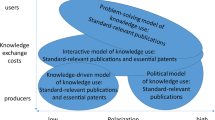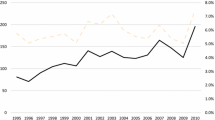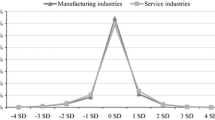Abstract
In this paper we examine public sector researchers’ participation in standardisation bodies. Whereas previous research emphasized on patents and publications as outputs of research activities, we also consider standardisation as another activity of researchers. The latter has not been adequately taken into account. Assuming that publishing and patenting activities have an influence on researchers’ involvement in standardisation we seek evidence based on objective publishing, patenting and standardisation data. Based on individual data of more than 600 researchers from the BAM Federal Institute for Materials Research and Testing in Germany, we perform multivariate regression analyses to determine the characteristics that influence researchers’ participation in standardisation at different levels. The estimation results show a negative relationship between high quality scientific publications productivity and participation in standardisation committees and a positive relationship between technical and industry-oriented publications productivity and standardisation activities. Patenting and standardisation activities appear to be contradictory only in a few model specifications. Academic qualifications of the researchers have a positive and statistically significant impact on the probability of participating in standardisation committees. Our findings reveal important insights for analysing researchers’ activities in the future, but also for the management of research institutes and for policy makers.

Similar content being viewed by others
Notes
According to EU-Regulation No 1025/2012 standard means a technical specification, adopted by a recognised standardisation body, for repeated or continuous application, with which compliance is not compulsory. CEN, the European Committee for Standardisation, publishes the following definition:
A standard is a technical document designed to be used as a rule, guideline or definition. It is a consensus-built, repeatable way of doing something. Standards are created by bringing together all interested parties such as manufacturers, consumers and regulators of a particular material, product, process or service. All parties benefit from standardisation through increased product safety and quality as well as lower transaction costs and prices. (www.cen.eu).
According to ISO/IEC Guide 2.2004 standardisation is an “activity of establishing, with regard to actual or potential problems, provisions for common and repeated use, aimed at the achievement of the optimum degree of order in a given context”. One important benefit of standardisation is the “facilitation of technological cooperation”.
ISO (International Organisation for Standardisation), IEC (International Electrotechnical Commission, CEN (European Committee for Standardisation, CENELEC (European Committee for Electrotechnical Standardisation), DIN (German Institute for Standardisation, DKE (German Electrotechnical Commission in DIN and VDE), ASTM (American Society for Testing and Materials).
References
Blind, K. (2006). Explanatory factors for participation in formal standardisation processes: Empirical evidence at firm level. Economics of Innovation and New Technology, 15(2), 157–170.
Blind, K., & Gauch, S. (2009). Research and standardisation in nanotechnology: Evidence from Germany. Journal of Technology Transfer, 34, 320–342.
Blind, K., & Mangelsdorf, A. (2013). Alliance formation of SMEs: Empirical evidence from standardization committees. IEEE Transactions on Engineering Management, 60(1), 148–156.
Blind, K., & Thumm, N. (2004). Interdependencies between intellectual property protection and standardisation strategies. Research Policy, 33, 1583–1598.
BMBF. (2010). Bundesministerium für Bildung und Forschung—Federal Ministry of Education and Research. Ideas. Innovation. Prosperity. High-Tech Strategy 2020 for Germany, Bonn, Berlin.
Bozeman, B. (2000). Technology transfer and public policy: A review of research and theory. Research Policy, 29, 627–655.
Choi, D. G., Lee, H., & Sung, T. (2011). Research profiling for ‘standardization and innovation’. Scientometrics, 88, 259–278.
European Commission. (2008). Communication from the commission to the council, the European Parliament and the European economic and social committee: Towards an increased contribution from standardisation to innovation in Europe, COM (2008) 133 final, March 11, 2008, Brussels.
Grant, E. B., & Gregory, M. J. (1997). Tacit knowledge, the life cycle and international manufacturing transfer. Technology Analysis & Strategic Management, 9(2), 149–161.
Hise, R., Choi, Y., Shin, J., & Park, M. (2010). Standardisation/adaptation strategies of South Korean food product companies. International Journal of Business Strategy, 10(1), 78.
Landry, R., Saïhi, M., Amara, N., & Ouimet, M. (2010). Evidence on how academics manage their portfolio of knowledge transfer activities. Research Policy, 39, 1387–1403.
Martin, B. R., & Irvine, J. (1983). Assessing basic research: Some partial indicators of scientific progress in radio astronomy. Research Policy, 12, 61–90.
OECD. (2002). Frascati Manual: Proposed standard practice for surveys on research and experimental development (6th ed.). Paris: OECD.
Author information
Authors and Affiliations
Corresponding author
Appendix
Appendix
Rights and permissions
About this article
Cite this article
Zi, A., Blind, K. Researchers’ participation in standardisation: a case study from a public research institute in Germany. J Technol Transf 40, 346–360 (2015). https://doi.org/10.1007/s10961-014-9370-y
Published:
Issue Date:
DOI: https://doi.org/10.1007/s10961-014-9370-y
Keywords
- Standardisation
- Knowledge and technology transfer
- Research productivity
- Scientific publications
- Patent applications




